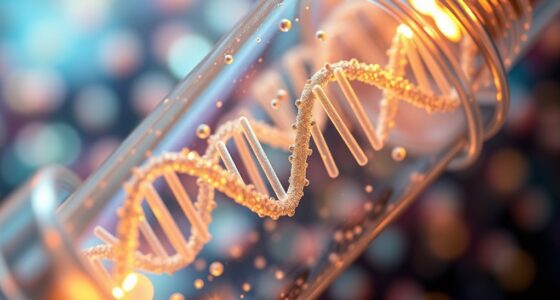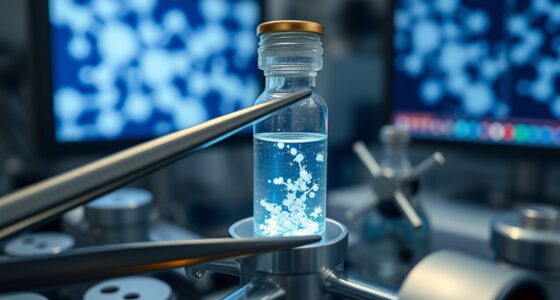Your body needs trace metals because they act as essential cofactors for enzymes, helping drive essential biochemical reactions like energy production and oxygen transport. They support your immune system, aid in DNA synthesis, and keep your physiological balance in check. By ensuring proper absorption and regulation, these micronutrients prevent deficiencies and toxicity. Understanding the chemistry behind how trace metals work reveals how important they are for your overall health—stay tuned to learn more about their amazing roles.
Key Takeaways
- Trace metals serve as cofactors that activate enzymes vital for processes like energy production and DNA synthesis.
- They facilitate mineral absorption, ensuring essential nutrients are properly taken up and utilized by the body.
- Metals stabilize enzyme reaction intermediates, lowering activation energy and enabling efficient biochemical reactions.
- Proper levels of trace metals maintain physiological balance, preventing deficiencies or toxicities that can impair health.
- They support critical functions such as oxygen transport, immune response, and tissue repair through their role in enzyme activity.

Trace metals and micronutrients are essential for maintaining your health, yet they’re needed only in small amounts. Despite their tiny presence, they play a huge role in keeping your body functioning effectively. One of the key ways they do this is through mineral absorption, a process that allows your body to take in and utilize these necessary elements efficiently.
When you consume foods rich in trace metals like zinc, copper, manganese, or iron, your body breaks them down and absorbs them into your bloodstream. This absorption isn’t random; it’s a carefully regulated process that guarantees you get enough of each nutrient without overloading your system. Proper mineral absorption ensures critical biological processes run smoothly—think of it as finely tuning an engine to perform at its best.
Once absorbed, many trace metals serve as cofactors for enzymes—specialized proteins that catalyze chemical reactions essential for life. Enzyme catalysis is the engine behind numerous physiological functions, from energy production to DNA synthesis. For example, iron is a fundamental component of hemoglobin, helping your blood carry oxygen, while zinc supports immune functions by activating enzymes responsible for cell growth and repair.
Without these metals, enzyme activity would slow dramatically or halt altogether, impairing your body’s ability to heal wounds, fight infections, or generate energy. The chemistry behind enzyme catalysis hinges on these metals’ ability to bind temporarily to enzymes, stabilizing reaction intermediates and lowering the energy required for reactions to proceed. This makes processes that might otherwise be too slow or inefficient happen rapidly and reliably. Additionally, recent research highlights how metal chelation influences the bioavailability of trace metals, affecting overall health. Moreover, maintaining this balance is crucial because disrupted metal homeostasis can lead to various health issues, emphasizing the importance of proper intake.
Your body carefully balances the levels of trace metals to maintain this delicate chemistry. Too little, and enzyme functions falter, leading to deficiencies that can cause fatigue, weakened immunity, or developmental issues. Too much, and there’s a risk of toxicity, which can damage tissues and disrupt cellular functions. That’s why consuming a balanced diet with a variety of nutrient-rich foods is essential. It guarantees you’re getting enough trace metals to support enzyme catalysis and effective mineral absorption without risking overload.
Frequently Asked Questions
How Do Trace Metals Influence Mental Health and Cognitive Function?
Trace metals play a crucial role in your mental health and cognitive function. They support neurotransmitter regulation, helping your brain communicate effectively.
Adequate levels of these metals also promote proper cognitive development, especially during growth and learning phases.
When you maintain balanced trace metal intake, you enhance your memory, focus, and mood, ensuring your brain stays healthy and functions most effectively.
Neglecting these nutrients can lead to cognitive decline and mental health issues.
Can Excess Trace Metals Cause Toxicity or Health Issues?
Excess trace metals can definitely cause toxicity or health issues. When you have a toxic buildup of metals like lead, mercury, or cadmium, it can lead to metal poisoning, affecting your organs and nervous system.
This buildup often results from environmental exposure or over-supplementation. If left unchecked, it can cause serious health problems, so it’s important to monitor your intake and avoid unnecessary exposure to prevent metal poisoning.
Are Trace Metals Equally Important for Children and Adults?
You might wonder if trace metals are equally vital for children and adults. Their age-specific requirements vary because children’s bodies are still developing, making these micronutrients crucial for growth and development.
Inadequate intake can affect developmental impacts, while excess can cause toxicity. So, ensuring the right balance tailored to your age is essential for maintaining health and supporting ideal development at every stage of life.
How Does Soil Quality Affect Trace Metal Levels in Food?
Like Pandora’s box, soil quality holds many secrets that impact your food. When soil contamination occurs, it modifies mineral bioavailability, meaning essential trace metals might become scarce or overly abundant.
This directly affects the trace metal levels in your food, potentially leading to deficiencies or excesses. Healthy soil guarantees your produce contains the right minerals, supporting your overall health.
Poor soil quality, however, disturbs this delicate balance, impacting your nutrient intake.
What Are the Best Dietary Sources of Essential Trace Metals?
You should focus on diverse food sources to guarantee adequate dietary intake of essential trace metals. For example, seafood and nuts are rich in zinc and copper.
Leafy greens and legumes provide iron. Incorporate a variety of these foods into your diet to cover your needs naturally.
Eating a balanced diet helps maintain ideal trace metal levels, supporting overall health and preventing deficiencies.
Conclusion
Remember, your body’s balance relies on these tiny trace metals—powerful, precious, and perfectly preserved. By understanding their vital roles, you can confidently care for your core, combat deficiencies, and cultivate a healthier, happier life. Don’t overlook these minuscule marvels that make mighty differences. Keep your chemistry clear, your body balanced, and your wellbeing wondrously well-fed with the wonder of essential micronutrients. Truly, tiny trace metals create tremendous transformations!









